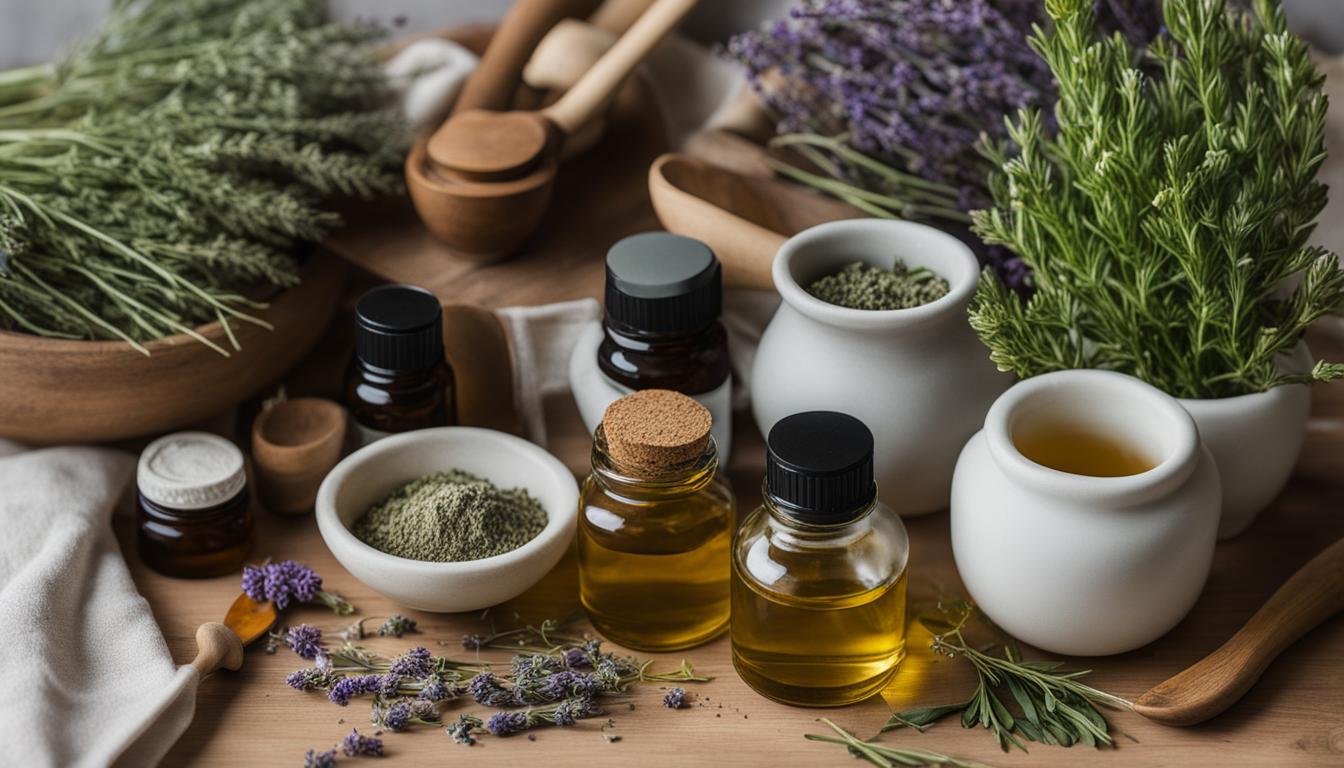Hey there! Are everyday stressors building up and making life feel overwhelming? Well, you’re not alone. Stress has become an unwelcome companion for many of us, causing anxiety and affecting our overall well-being. But fear not! I have some fantastic DIY natural remedies that can help you achieve stress-free living and restore your inner zen.
From relaxation exercises to time management strategies, these stress management techniques and self-care strategies can make a world of difference in your life. Say goodbye to stress and hello to a happier, more balanced you! So, let’s dive right in and explore these amazing natural remedies for stress relief.
Key Takeaways:
- Exercise regularly to reduce anxiety and improve overall well-being.
- Meditate to find calm amidst the chaos and manage stress effectively.
- Practice relaxation exercises to unwind tension and promote relaxation.
- Try journaling as a way to express anxiety and gain a sense of control.
- Implement time management strategies to balance commitments and reduce anxiety caused by overwhelming tasks.
Now that you’re armed with these fabulous DIY natural remedies, it’s time to experience a stress-free lifestyle like never before. Remember, a little self-care can go a long way in improving your overall well-being. So why wait? Start incorporating these stress management techniques into your daily routine and reclaim your peace of mind.
Exercise: A Natural Stress Buster
When it comes to managing stress, there’s no better remedy than good old exercise. Not only does it help keep your body fit and healthy, but it also has a profound impact on your mental well-being. Studies have shown that physical exercise can be a powerful tool in reducing anxiety symptoms and improving overall mood.
Whether it’s a vigorous cardio workout or a gentle yoga session, exercise has been found to release endorphins, which are the body’s natural stress fighters. These feel-good chemicals can help alleviate anxiety and promote a sense of calm and relaxation.
In fact, research has shown that high-intensity exercise tends to be more effective in reducing anxiety than low-intensity regimens. So, if you’re feeling overwhelmed by stress, consider breaking a sweat with a challenging workout.
Exercise can also be particularly beneficial for those facing stressful circumstances, such as quitting smoking. Engaging in physical activity can distract your mind from cravings and provide a healthy outlet for stress management.
Benefits of Regular Exercise:
- Relieves tension and boosts mood
- Increases energy levels
- Promotes better sleep
- Enhances cognitive function
- Strengthens the immune system
“Exercise is like an all-natural stress relief pill. It’s free, easy to access, and has no negative side effects. So why not give it a try?”
To incorporate exercise into your stress management routine, try the following tips:
- Find an activity you enjoy: It could be jogging, dancing, swimming, or even joining a sports team. The key is to choose something that makes you happy and keeps you motivated.
- Set realistic goals: Start with small, achievable goals and gradually increase the intensity and duration of your workouts. This will help you stay committed and avoid burnout.
- Make it a habit: Schedule regular exercise sessions into your daily or weekly routine. Treat them as non-negotiable appointments with yourself.
- Include variety: Mix up your workouts to keep things interesting and prevent boredom. Try different exercises, classes, or outdoor activities to challenge yourself.
- Listen to your body: Pay attention to how exercise makes you feel. If you’re tired or in pain, it’s important to rest and give your body the recovery time it needs.
Remember, exercise is not just a means to achieve physical fitness; it’s a powerful tool for stress reduction and overall well-being. So lace up your sneakers, put on your favorite workout playlist, and let the endorphins do their magic!
Meditation: Finding Calm Amidst the Chaos
When life gets overwhelming, finding peace can seem like an impossible task. That’s where meditation comes in—a powerful tool for finding calm amidst the chaos. Meditation is a practice that involves focusing your mind and eliminating the stream of thoughts that can contribute to stress and anxiety.
There are several meditation styles that you can try, each with its own unique benefits. One popular style is mindfulness meditation, which involves being fully present in the moment and observing your thoughts and emotions without judgment. This practice can help you gain clarity and reduce stress levels.
Another effective form of meditation is incorporating it into your yoga practice. As you move through different yoga poses, you can focus on your breath and bring your attention to the sensations in your body. This combination of physical movement and meditation can have a profound impact on reducing stress and promoting relaxation.
Studies have shown that incorporating meditation into your daily routine can lead to various benefits, including reduced anxiety, improved emotional well-being, enhanced self-awareness, and increased resilience to stress. By dedicating a few minutes each day to quieting the mind, you can experience a significant shift in your overall well-being.
Benefits of Meditation:
- Reduces stress and anxiety levels
- Improves emotional well-being
- Enhances self-awareness
- Promotes relaxation and calm
- Boosts resilience to stress
“Meditation is not a way of making your mind quiet. It’s a way of entering into the quiet that’s already there.” – Deepak Chopra
So, how can you start incorporating meditation into your daily life? Begin by finding a quiet and comfortable space where you won’t be easily distracted. Sit in a comfortable position, close your eyes, and take a few deep breaths to relax. Choose a meditation technique that resonates with you, whether it’s focusing on your breath, repeating a mantra, or visualizing a peaceful scene.
Over time, with consistent practice, you’ll find that meditation becomes easier, and the benefits become more apparent. It’s important to approach meditation with an open mind and without judgment—each session is a unique experience, and there’s no right or wrong way to meditate.

Incorporating meditation into your daily routine can be an excellent self-care strategy for managing stress and anxiety. Give it a try and see how it can bring a sense of peace and tranquility to your life.
Relaxation Exercises: Unwinding Tension
When stress and tension become overwhelming, it’s important to have effective relaxation exercises at your fingertips. These exercises can provide relief and help calm your mind and body. One popular technique is progressive muscle relaxation, which targets muscle tension and reduces stress levels.
Progressive muscle relaxation involves the systematic tensing and releasing of different muscle groups. By deliberately tensing each muscle group and then releasing it, you can bring awareness to areas of tension and promote relaxation. This exercise can be done anywhere and at any time, making it a convenient stress management technique. Here’s how to do it:
- Sit or lie down in a comfortable position.
- Starting from your toes, tense the muscles in your feet by curling your toes and holding the tension for a few seconds.
- Release the tension in your toes, allowing them to relax completely.
- Move up to your calves and repeat the process, tensing the muscles and then releasing.
- Continue this pattern, working your way up your body, tensing and releasing each muscle group as you go. Be sure to include your thighs, buttocks, abdomen, chest, arms, hands, neck, and face.
- As you release each muscle group, focus on the sensation of relaxation and let go of any tension you may be holding.
Practicing progressive muscle relaxation on a regular basis can have significant benefits for stress reduction. In addition to relieving muscle tension, it can also improve sleep quality and lower blood pressure. This simple yet effective technique is a great addition to your stress management toolbox.

Image illustrating relaxation exercises, a key stress management technique.
Journaling: Expressing Anxiety on Paper
Journaling is a powerful tool that can help us navigate through our anxious thoughts and emotions. As I mentioned earlier, stress management techniques come in many different forms, and journaling is one of the most accessible and effective methods. When we put pen to paper and pour out our anxieties, we create a safe space to express and explore our feelings.
Writing about our emotions and experiences can significantly reduce mental distress and improve overall well-being. It allows us to release pent-up emotions and gain clarity on what’s causing our stress. Journaling is not just about venting; it’s about gaining insights and finding solutions.
“I find journaling to be incredibly therapeutic. It’s my personal sanctuary where I can let go of my worries and anxieties. The act of writing itself helps my mind to calm down, and going back to read my entries later provides valuable perspective and growth.” – Sandra Thompson, avid journaler
Journaling can be as structured or as freeform as you want it to be. Here are a few stress reduction tips to guide your journaling practice:
- Set aside time each day to write in your journal. Treat it as a non-negotiable self-care activity.
- Find a quiet and comfortable space where you can focus and reflect without distractions.
- Start by writing about your current feelings and thoughts. Let your emotions flow without judgment or censorship.
- Consider using prompts or guided journaling exercises to explore specific areas of stress or anxiety.
- Reflect on past entries and identify patterns or triggers that contribute to your stress levels.
- Don’t shy away from expressing gratitude and celebrating small victories. Positive affirmations can create a shift in mindset.
Remember, there’s no right or wrong way to journal. It’s all about finding what works for you and allowing yourself to be open and honest in your writing. Journaling is a personal journey that can provide immense relief and growth, so grab a pen and start journaling your way to a stress-free mindset.
Time Management Strategies: Balancing Commitments
When it feels like there are too many things on your plate, effective time management strategies can be your lifesaver. We all know that overwhelming feeling of having a never-ending to-do list, deadlines looming over our heads, and commitments pulling us in every direction. But fear not, my friend, for I have some stress-reducing tips up my sleeve!
One powerful technique is to break down major projects into manageable steps. Think of it like a puzzle. Instead of trying to conquer the entire thing at once, focus on putting one piece in its place at a time. Trust me, it’s much easier to handle and far less stressful when you tackle tasks one step at a time.
Another handy trick is to have a plan for the next necessary action. Sometimes, anxiety creeps in when we’re not sure what the next step should be. By mapping out your action plan and knowing exactly what comes next, you can keep anxiety at bay and stay on track.
Remember, my friend, time management is not just about checking tasks off a list. It’s about finding balance amidst the chaos and prioritizing what truly matters. With a little organization and thoughtful planning, you’ll be amazed at how much stress you can alleviate.
| Time Management Strategies | Benefits |
|---|---|
| 1. Create a daily schedule | Stay organized and focused |
| 2. Set realistic goals | Reduce overwhelm and increase productivity |
| 3. Prioritize tasks | Focus on what’s important and minimize stress |
| 4. Delegate when possible | Lighten your load and free up time |
| 5. Avoid multitasking | Improve efficiency and concentration |
| 6. Take regular breaks | Refresh your mind and prevent burnout |
| 7. Learn to say no | Protect your time and avoid overcommitment |
| 8. Use technology to your advantage | Stay organized and automate repetitive tasks |
So, my dear reader, I hope these time management strategies help you find the balance you need in your life. Remember, it’s not about doing more, but doing what matters most. Take control of your time, reduce stress, and enjoy the peace that comes with effective time management.
Aromatherapy: The Power of Scents
When it comes to stress management techniques, aromatherapy is a hidden gem that can work wonders. The use of essential oils in aromatherapy has long been hailed for its ability to ease stress and anxiety, and promote relaxation.
One popular essential oil known for its stress reduction properties is lavender. The soothing scent of lavender has been scientifically proven to have a calming effect on the mind and body. Inhaling lavender oil can help lower blood pressure, reduce heart rate, and induce a state of relaxation.
Aromatherapy involves diffusing essential oils or applying them topically to experience their therapeutic benefits. Essential oils can be used in a variety of ways, such as through a diffuser, in a bath, or as a massage oil. Experimenting with different scents can help you find the most effective one for your individual stress relief needs.
The Science Behind Aromatherapy
Research has shown that aromatherapy can help alleviate stress and anxiety by stimulating the limbic system, the part of the brain responsible for emotions and memory. When we inhale essential oils, their molecules travel to the brain through the olfactory system, triggering a calming response.
In addition to lavender, other essential oils that are known for their stress-reducing properties include bergamot, chamomile, ylang-ylang, and rose. Each oil has its own unique scent and therapeutic benefits, so it’s worth exploring different options to find what works best for you.
Aromatherapy can be a powerful tool in your stress management toolkit. By harnessing the power of scents, you can create a calming and soothing environment that promotes relaxation and helps reduce anxiety.
Whether you choose to incorporate aromatherapy into your daily routine or reserve it for moments of high stress, the power of scents can make a significant impact on your overall well-being. Take a moment to breathe in the soothing aroma of essential oils and let your worries melt away.
Conclusion
In today’s fast-paced world, it’s no wonder that stress and anxiety have become common issues. But the good news is that there are plenty of ways to manage and alleviate these burdens. By embracing a stress-free lifestyle and incorporating holistic stress relief techniques into your daily routine, you can find natural stress management solutions that work for you.
One effective approach is cognitive behavioral therapy (CBT), which helps you understand the connection between your thoughts, emotions, and behaviors. Through therapy, you can gain valuable insight into your anxiety and develop coping mechanisms to navigate life’s challenges.
For some individuals, medication may be necessary to manage chronic anxiety. Consulting with a healthcare professional can help you determine if medication is the right path for you. However, it’s important to remember that natural remedies can also play a vital role in your stress management journey. DIY stress relief techniques, such as exercise, meditation, relaxation exercises, journaling, time management strategies, and aromatherapy, can offer holistic stress relief.
Remember, everyone’s stress journey is unique. What works for one person may not work for another. So, don’t be afraid to experiment and find the combination of therapies and remedies that best suit your needs. By taking a proactive approach to stress management, you can pave the way to a healthier, happier, and more stress-free life.
FAQ
Are natural remedies effective for stress relief?
Yes, natural remedies can be effective for stress relief. Exercise, meditation, relaxation exercises, journaling, time management strategies, and aromatherapy are all natural techniques that can help reduce stress and promote overall well-being.
Can exercise help with stress management?
Absolutely! Exercise is a natural stress buster. It can reduce anxiety symptoms, improve overall well-being, and help manage stress caused by various factors, including quitting smoking or dealing with stressful circumstances.
How can meditation help with stress reduction?
Meditation can help slow racing thoughts and make it easier to manage stress and anxiety. Mindfulness and meditation during yoga are popular meditation styles that can be effective in reducing stress and promoting relaxation.
What are relaxation exercises, and how do they help with stress?
Relaxation exercises, such as progressive muscle relaxation, can alleviate muscle tension and reduce stress. These exercises involve consciously tensing and releasing different muscle groups. They can also improve sleep and lower blood pressure.
Can journaling help with anxiety and stress management?
Yes, journaling and expressive writing can help people cope better with anxiety and stress. Writing about emotions and experiences can reduce mental distress and improve overall well-being. Journaling is a simple and effective way to express anxiety and make it feel more manageable.
How can time management strategies reduce stress?
Effective time management strategies can help reduce anxiety caused by having too many commitments. Breaking down major projects into manageable steps and having a plan for the next necessary action can make tasks less stressful and keep anxiety at bay.
Can aromatherapy help with stress relief?
Yes, certain scents from essential oils, like lavender, can help ease stress and anxiety. Aromatherapy involves smelling soothing plant essential oils and has been found to be helpful in treating anxiety disorders. Experimenting with different scents can help find the most effective one for individual stress relief.
How can natural remedies contribute to a stress-free lifestyle?
Natural remedies, alongside therapy, lifestyle changes, and medications, can offer holistic stress relief. DIY natural remedies provide individuals with self-care strategies and stress management techniques that can be used alongside conventional medical therapies. Trying different combinations of therapies and remedies can help individuals find what works best for their stress management and overall well-being.

